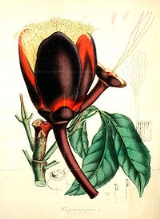
Caryocar
Encyclopedia
Caryocar is a genus
of flowering plant
s, in the South American family
Caryocaraceae
. There are 15 species
in this genus, all tree
s that yield a strong timber
. Eight species within the genus Caryocar have edible fruit
s, called souari-nuts or sawarri-nuts. The most well-known species is probably the Pekea-nut (C. nuciferum). In Brazil
the Pequi (C. brasiliense) is most popular; it has a variety of uses, not the least among them being the production of pequi oil
. Furthermore, some species are used by indigenous peoples to produce poison
s for hunting.
Genus
In biology, a genus is a low-level taxonomic rank used in the biological classification of living and fossil organisms, which is an example of definition by genus and differentia...
of flowering plant
Flowering plant
The flowering plants , also known as Angiospermae or Magnoliophyta, are the most diverse group of land plants. Angiosperms are seed-producing plants like the gymnosperms and can be distinguished from the gymnosperms by a series of synapomorphies...
s, in the South American family
Family
In human context, a family is a group of people affiliated by consanguinity, affinity, or co-residence. In most societies it is the principal institution for the socialization of children...
Caryocaraceae
Caryocaraceae
Caryocaraceae is a family of flowering plants consisting of two genera and about 25 species. The family is exclusively neotropical.- Species :Anthodiscus*Anthodiscus obovatus Benth. ex Wittm.*Anthodiscus pilosus Ducke...
. There are 15 species
Species
In biology, a species is one of the basic units of biological classification and a taxonomic rank. A species is often defined as a group of organisms capable of interbreeding and producing fertile offspring. While in many cases this definition is adequate, more precise or differing measures are...
in this genus, all tree
Tree
A tree is a perennial woody plant. It is most often defined as a woody plant that has many secondary branches supported clear of the ground on a single main stem or trunk with clear apical dominance. A minimum height specification at maturity is cited by some authors, varying from 3 m to...
s that yield a strong timber
Timber
Timber may refer to:* Timber, a term common in the United Kingdom and Australia for wood materials * Timber, Oregon, an unincorporated community in the U.S...
. Eight species within the genus Caryocar have edible fruit
Fruit
In broad terms, a fruit is a structure of a plant that contains its seeds.The term has different meanings dependent on context. In non-technical usage, such as food preparation, fruit normally means the fleshy seed-associated structures of certain plants that are sweet and edible in the raw state,...
s, called souari-nuts or sawarri-nuts. The most well-known species is probably the Pekea-nut (C. nuciferum). In Brazil
Brazil
Brazil , officially the Federative Republic of Brazil , is the largest country in South America. It is the world's fifth largest country, both by geographical area and by population with over 192 million people...
the Pequi (C. brasiliense) is most popular; it has a variety of uses, not the least among them being the production of pequi oil
Pequi oil
Pequi oil is a seed oil, extracted from the seeds of the Caryocar brasiliense, which is native to Brazil. The pale yellow mesocarp oil is extracted and used directly as a cooking oil...
. Furthermore, some species are used by indigenous peoples to produce poison
Poison
In the context of biology, poisons are substances that can cause disturbances to organisms, usually by chemical reaction or other activity on the molecular scale, when a sufficient quantity is absorbed by an organism....
s for hunting.
Species
- Caryocar amygdaliferumCaryocar amygdaliferumCaryocar amygdaliferum is a plant native to the rain forests of the Choco region of Colombia and Panama. Its fruit consists of a spiny husk inside which a seed about three times the size of an almond develops. It has been used for similar purpose as the almond and was traded as a luxury item among...
- Caryocar amygdaliformeCaryocar amygdaliformeCaryocar amygdaliforme is a species of plant in the Caryocaraceae family. It is found in Colombia, Panama, and Peru.-Sources:* Calderon, E. 1998. . Downloaded on 21 August 2007....
- Caryocar barbinerve Miq.
- Caryocar brasilienseCaryocar brasilienseCaryocar brasiliense, known as Pequi or "souari nut", like its congeners, is an edible fruit popular in some areas of Brazil, especially in Brazil's center-west region....
– Pequi - Caryocar coccineum
- Caryocar coriaceumCaryocar coriaceumCaryocar coriaceum is a species of plant in the Caryocaraceae family. It is endemic to Brazil.-Sources:* Prado, D. 1998. . Downloaded on 21 August 2007....
- Caryocar costaricenseCaryocar costaricenseCaryocar costaricense is a species of plant in the Caryocaraceae family. It is found in Colombia, Costa Rica, Panama, and Venezuela. It is threatened by habitat loss.-References:...
- Caryocar cuneatum Wittm.
- Caryocar dentatum
- Caryocar edule Casar.
- Caryocar glabrum (Aubl.) Pers. (= C. microcarpum, Saouari glabra)
- Caryocar intermedium Wittm.
- Caryocar montanum
- Caryocar nuciferumCaryocar nuciferumCaryocar nuciferum, the Butter-nut of Guiana, is also known as Pekea-nut, or – like all other species of Caryocar with edible nuts – "souari-nut" or "sawarri-nut". It is a fruit tree native to northern Brazil, Colombia, Costa Rica, Guyana, Panama, and Venezuela.It grows up to 35 m, in...
– Pekea-nut, Butter-nut of Guinea - Caryocar villosum (Aubl.) Pers. (= Saouari villosa)

